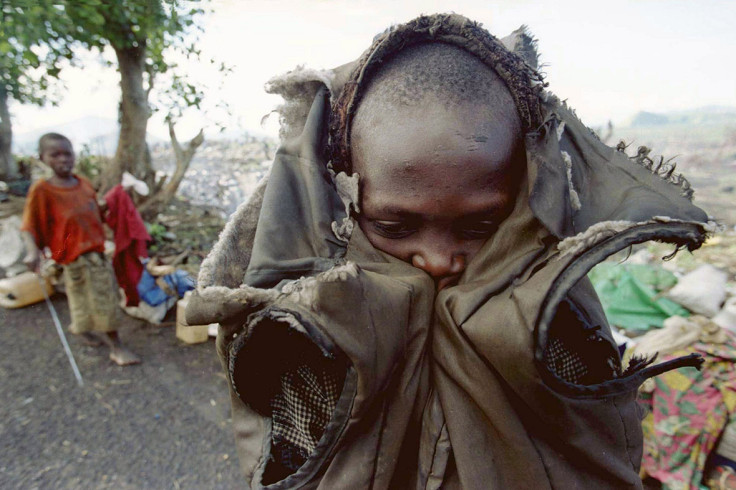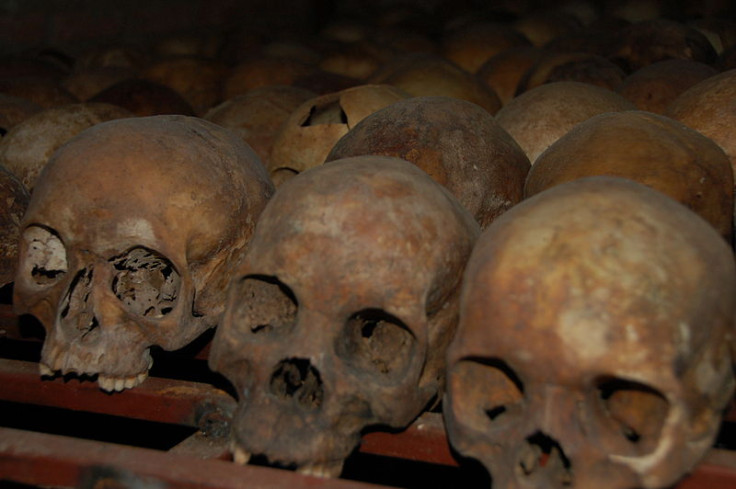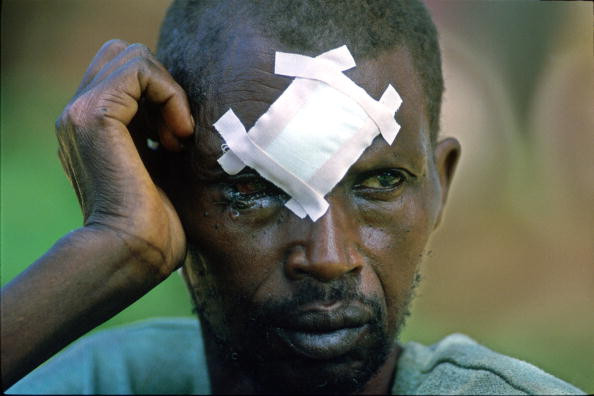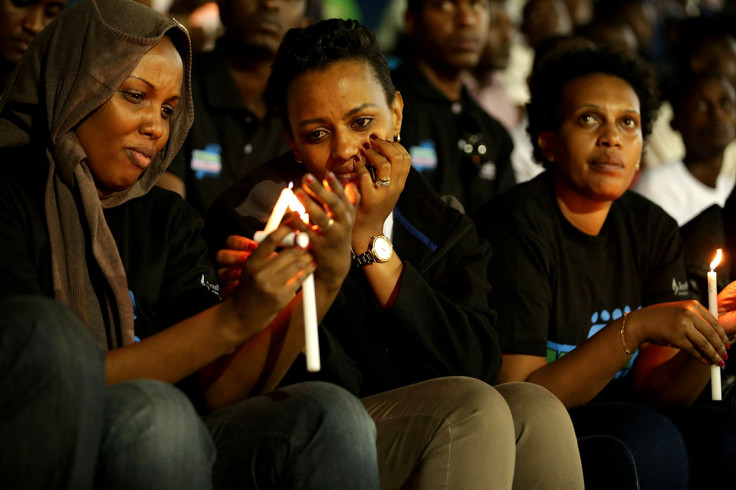Rwanda genocide anniversary: A story of love and death
IBTimes UK has chosen some book extracts to commemorate the UN-designated Day of Remembrance of the Victims.

Rwanda genocide
Tensions between Hutu and Tutsi ethnic groups started with the Belgian colonisation in 1922. The colonisers supported the Tutsi political power and exacerbated ethnic differences between Hutu and Tutsi by introducing the compulsory use of identity cards.
After a Hutu revolution led to the 1962 declaration of independence and the establishment of the Rwanda republic, led by the MDR-Parmehutu, the country was rocked by sporadic violence between the Hutu government and Tutsi rebels.
In 1990 the Rwanda Patriotic Front (RPF), formed by Tutsi refugees who had fled along with their families to Uganda due to ethnic violence in the previous years, invaded Rwanda, starting the Rwanda civil war.
The conflict lasted until 1994, when the genocide against the Tutsi was sparked after suspicions spread that the Tutsi had carried out an attack against the then Hutu president Juvénal Habyarimana, who died together with Burundi's President Cyprien Ntaryamira in a plane crash on 6 April 1994.
10 April 1994: The Silence of Nyamata is a historical novel that tells the tormented love story between a Tutsi girl and a Hutu boy in Nyamata, a town in southeastern Rwanda. The couple's first encounter occurs in 1993, one year before the genocide erupts in the country.
The more Caritas' and Innocent's lives intertwine and their love grows, the more the genocide threatens their future and that of their families.
By following Caritas' first discovery of love and human cruelty, the book leads the readers through the events that culminate in the 1994 Rwandan genocide, in which hundreds of thousands of Tutsi and moderate Hutu (who refused to take part in the killings of the Tutsi) were systematically executed by the Hutu majority before the eyes of the international community.
It is estimated that between 800,000 and 1m people, including women and children, were killed in the three months from 6 April to 15 July 1994.
10 April 1994: The Silence of Nyamata, by IBTimesUK reporter Ludovica Iaccino, was published as an e-book in January 2015. Copies can be ordered via Amazon for £3.99.
Part of the proceeds will be donated to the sisters of Charity Saint Jeanne Antide in Shire, Ethiopia, where Ludovica did volunteer work with street children in August 2014.
IBTimes UK has chosen some extracts of the book to commemorate the UN-designated Day of Remembrance of the Victims of the Rwanda Genocide, which falls on 7 April.
Remembrance
Imagine fourteen hills covered by a carpet of red dust, hills where the sky embraces fields of papyrus and banana trees, eucalyptus forests, coffee and grain plantations and, everywhere, flowers.
Imagine the voices of colourfully dressed women, dances around the fire, the explosive joy of weddings, children playing football, fishermen smoking the fish they will sell at the market, kids' laughter, bicycles by the thousand, African nuns laughing together with European nuns.
And now, imagine broken glass, crushed, mutilated and outraged bodies, the fractured skulls of babies, raped women no longer with arms, legs or faces, houses on fire, machetes, shotguns, grenades, sticks, screams of hatred and pain, abandoned pity, violence, the indifference of God.
Now that you have imagined all this, try to put it in a church with its walls entirely covered with blood, and you will realise only one tenth of what happened in Rwanda.
The radio kept telling jokes against the Inyenzi, the cockroaches; those who had everything and therefore had to be crushed to death. These kinds of jokes were very common during radio broadcasts; Mille Colline radio, in particular, vehemently incited its listeners to the liquidation of the Tutsi.
This radio station used to preach very often something that Elie himself considered his personal Bible: the Ten Hutu Commandments, a real guide to racial hatred. According to these commandments, a Mututsi (a person of Tutsi origins) worked solely for people of his own race; consequently, every Muhutu (person of Hutu origins) who married a person of the other ethnic group was a traitor. Mututsi were also dishonest in trade and aimed for Tutsi supremacy. Consequently, every Muhutu who traded with Mututsi was considered a traitor of the worst species. Furthermore, all the principal jobs in the country – political, administrative, economic, military, security and teaching – belonged exclusively to the Tutsi.
The Hutu were expected to change that situation. The commandments were taught in public places, everywhere the Hutu could express their frustration and hate. The commandments were recited by heart, and people's bitter sentiments were slowly transforming into the violent need to destroy what was considered as the enemy.
In addition, the radio continually dished out slogans containing strong racist messages: "Hutu, stay united, the Tutsi have robbed you"; "You are poor because the Tutsi are here"; "Kill the Tutsi and you will live better. You will have their possessions."
Everybody used to listen to the radio broadcasts all day every day in Rwanda.

The truth was that the Hutu had been chosen by colonisers to be a subordinate group because they were considered inferior. The Tutsi had become the dominant class: they could access education, medical assistance and politics.
The Tutsi were tall, strong, intelligent and beautiful; they had power, money and happiness.
The Hutu were short, plump and poor; how could they be the superior race?
The Belgians were the ones to blame. They, in fact, had decided after World War I that whoever possessed more than ten cows should be considered an aristocrat. If a Hutu had only nine cows he was a poor and uneducated Hutu, but if he somehow found enough money to buy another cow, then all of a sudden he could join the privileged caste and be considered a Tutsi. Therefore someone who was ugly, plump and poor could inexplicably and suddenly become handsome, tall, clever and wealthy. The possibility of changing caste by acquiring more cattle was soon abolished, however, by the Belgians. Therefore, from that moment on, a Hutu could belong only to the inferior group for the whole of his life.
When in the 1930s the Belgians introduced the compulsory use of an identity card, the qualities of beauty and richness and the flaws of poverty and ugliness were reported on paper too.
Although during the night a veil of piercing frost descended over Nyamata, nobody shivered, for their bodies were paralysed by fear. They were standing in neat rows, hundreds of men and boys; some of them looked confused and dismayed, others sure they were doing the right thing.
The Interahamwes (those who stand together) were handing out machetes, without saying a word. They only spoke to give instructions, mechanically, their voices deprived of any hint of humanity. Their faces were severe, impassive. Not a single emotion could be read in their eyes, which were half closed, as if they were constantly analysing the surroundings. Their mouths were closed in a cold grip.
The Interahamwes explained that machetes were going to be used to kill because many Hutus already used this weapon in their daily work in the fields, or to chop wood and slaughter chickens. They said the machete should be held with both hands and that people had to carry out a circular move for the stab to be more effective, more violent.
"You must learn how to aim correctly, that is essential. You must be able to hit people with the right amount of force or they will be able to counter attack."
"Why can't we simply shoot them through the heart? It would be quicker. And less effort for us," said someone from the crowd.
"Out of the question!" shouted one of the Interahamwes. "In a few months you'll be able to kill with the machete at a fast pace. Guns for everybody are too expensive and it would take longer to train you how to shoot. You must learn how to kill by inflicting the highest pain on the Tutsis, you can't let them die quickly."

The dawn arrived quietly. The sun, just risen, shone uncertainly on the hill. A dull grey light, impregnated with mist and silence, greeted Caritas when she opened her eyes. A gloomy atmosphere had brought a strange sense of foreboding throughout the village.
There were no chants at the spring that morning and Caritas did not dance on her way to collect the water. She walked quietly, surrounded by suspicious and anxious faces. Fearful children held on to their mothers' pagnes while the women filled the canisters in silence and returned to their homes straight away. That morning, it seemed that nobody had time for a brief chat or a simple greeting.
On her return home, Caritas was surprised not to find her mother and grandmother outside preparing lunch. Instead she saw her father who was waving to her to hurry up.
"What's happening?" she asked, in alarm.
"Shh!" said her mother and then looked at the radio, waiting for the broadcast to start.
"We confirm this morning's news. Our Hutu president Habyarimana and Burundi's President Cyprien Ntaryamira are dead," a voice said.
"They were the victims of an attack that caused their plane to crash while they were returning from a meeting. The motives of the attack are still unknown but the authorities are investigating. There are rumours that this might be the beginning of a Tutsi revolution! It is no longer a secret that the Tutsis want to overthrow the Hutu government."
That bitter surprise hurt more than a cold grip around Caritas' heart.
As they had been living in that church for days, nobody knew that the massacres had already begun; between the night of 6th and 7th April, the army, the police and the militiamen were ready to execute the orders, just waiting for the signal.
It arrived by radio: "Cut the tall trees."
From that moment the days of the Hutus went at the same pace as work in the fields: in the morning they went hunting for Tutsis in their houses, in the fields, in the marshes. Some would kill with meticulous precision, while others rushed into the process, as they wanted to run back to their houses as soon as possible; some would whisper the names of acquaintances and friends and encourage them to come out from their hiding places.
The killers had quickly transformed into butchers with salivating mouths, eager to find flesh to slaughter.
They went on killing until they heard a whistle or a gun shot.
During the afternoon, the killers, often accompanied by their wives, looted the houses of the Tutsis and then set them on fire. They would then share the loot and count how many people they had killed that day.
Those who had distinguished themselves in the massacres received rewards, such as meat and beer.
"How many have you killed today?"
"Ten, you?"
"Just four."
"Don't worry, tomorrow you'll do better."

A rumble welcomed the dawn on the following day, 10th April, and the world suddenly became darkness and fear. What followed was genuine pandemonium – there were screams, curses, bullets shot all over the church, explosions and smoke.
Then, there was death.
People started running in every direction but, because of the heavy smoke and the limited space, they kept bumping into each other, unable to escape. When the smoke cleared, the Tutsis saw dozens of armed militiamen with shotguns and machetes standing at the entrance of the church.
They screamed again, some begged, others threw down their money and all their valuable possessions: anything they could use to save their lives. Many tried to move the militiamen by speaking about their children or elderly parents, too tired and sick to cope with these inhuman conditions.
The militiamen – farmers, cattle herders, office workers and even young boys whose eyes were filled with terror – were also scared and uncertain as to their next move. They were no terrorists; they were common people who had been brainwashed.
Many people began crying and screaming, some tried to escape through the windows, others, too panic-stricken to think properly, threw themselves on their killers who promptly hit them. The fearful behaviour of the Tutsis facilitated their deaths: the more they begged and cried, the more the Hutus found satisfaction in killing them.
If some Hutus killed slowly because of fear and inexperience, others did it for pleasure.
The militiamen hurled bombs and those who did not die from the machetes or the gunshots, suffocated from the smoke. Some detonators had been placed on the sides of the church and, once activated, they killed hundreds of people in a few seconds.
Legs, arms and heads flew all over the church.

10 April 1994: The Silence of Nyamata, by IBTimesUK reporter Ludovica Iaccino, was published as an e-book in January 2015. Copies can be ordered via Amazon for £3.99.
Part of the proceeds will be donated to the sisters of Charity Saint Jeanne Antide in Shire, Ethiopia, where Ludovica did volunteer work with street children in August 2014.
© Copyright IBTimes 2025. All rights reserved.



















